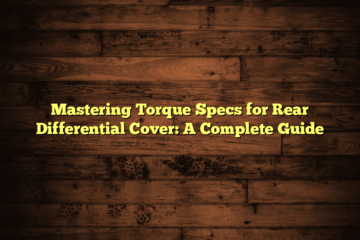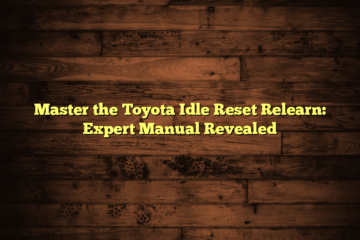Torque Specs Tie Rod End: Boost Performance with Expert Tips
The torque specs for tie rod ends vary depending on the specific vehicle make and model. It’s important to consult the manufacturer’s service manual for the exact torque specifications.
When it comes to ensuring the proper functionality and safety of your vehicle, understanding the torque specs for tie rod ends is crucial. By following the manufacturer’s recommendations, you can prevent over-tightening or under-tightening, which could lead to premature wear or steering issues.
We’ll delve into the importance of torque specs for tie rod ends and provide some general guidelines for checking and adjusting the torque on these critical components. By the end, you’ll have a better understanding of why torque specs matter and how to ensure your tie rod ends are properly torqued for optimal performance.
Importance Of Torque Specs For Tie Rod End
| Torque Specs Tie Rod End |
| Importance of Torque Specs for Tie Rod End |
| Proper Torque and Its Impact |
Using the correct torque values when tightening tie rod ends is crucial for safety and performance. Incorrect torque can lead to issues such as loose connections or damaged components.
Over-tightening can distort parts and make them weaker, while under-tightening can cause instability and potential failures.
Following the manufacturer’s specified torque settings ensures proper functionality and longevity of the tie rod end. Remember, proper torque is key.
Benefits Of Following Manufacturer’s Recommendations
Following the manufacturer’s recommendations for torque specs tie rod end is crucial for enhanced safety on the road. It ensures that the components are properly secured, reducing the risk of failure while driving. Moreover, adhering to the specified torque settings leads to optimal performance of the tie rod end, promoting handling stability and steering response. By correctly torquing the tie rod end, drivers can have peace of mind knowing that their vehicle is operating at its best, contributing to a safer and smoother driving experience.
How Incorrect Torque Affects Performance
Incorrect torque settings for tie rod ends can have a detrimental effect on the performance of a vehicle. The steering stability is severely compromised, leading to unsafe driving conditions. When the torque is not properly set, the tie rod ends may become loose, causing a loss of control and unpredictable steering behavior.
This instability can result in increased wear and tear on various steering components. The constant movement and vibrations caused by the incorrect torque can lead to premature wear of parts, including the tie rod ends themselves, the steering rack, and the steering linkage.
Regular inspections and proper torque settings are essential to ensure optimal performance and longevity of the tie rod ends and the overall steering system. By adhering to the manufacturer’s recommended torque specifications, drivers can maintain steering stability, minimize wear and tear, and ultimately enhance the safety and reliability of their vehicles.
Expert Tips For Achieving Correct Torque Specs
When using a torque wrench, always ensure it’s set to the manufacturer’s specified torque level. Regularly check and maintain the torque. Over or under-torquing may result in damage or failure. Re-torque after driving for a while or as recommended. Maintaining proper torque levels is crucial for safety, stability, and longevity of the tie rod ends. Regularly inspect for any signs of looseness or wear. Seek professional guidance if uncertain about the torque specifications or the condition of tie rod ends.
Common Mistakes When Torquing Tie Rod Ends
Torquing tie rod ends requires proper technique to avoid common mistakes. Be mindful of following torque specs to ensure a secure connection and prevent future issues.
| Common Mistakes When Torquing Tie Rod Ends |
| 1. Relying on ‘feel’ rather than using a torque wrench. 2. Ignoring manufacturer guidelines on torque specifications. |
Conclusion: Elevate Your Vehicle’s Performance
| Torque Specs Tie Rod End |
Elevate your vehicle’s performance by following ultimate torque tips recap for tie rod end maintenance. Precision in maintenance is crucial for optimal vehicle function and safety.
Frequently Asked Questions
How Tight Do You Torque Tie Rod Ends?
Tighten tie rod ends with the specified torque. Follow manufacturer guidelines to ensure proper tightness.
What Is The Torque Spec For A Tie Rod Nut?
The torque spec for a tie rod nut varies depending on the vehicle make and model. Always consult the manufacturer’s specifications to ensure proper tightening. Using a torque wrench, follow the recommended torque value to prevent over-tightening or under-tightening.
Do You Need A Torque Wrench For Tie Rods?
Yes, a torque wrench is necessary for accurately tightening tie rods to ensure proper vehicle alignment and safety.
Can You Over Tighten A Tie Rod End?
Yes, over tightening a tie rod end can damage it, causing premature wear and potential failure.
How Do You Find The Torque Specs For A Tie Rod End?
To find the torque specs for a tie rod end, consult your vehicle’s repair manual or a trusted online resource.
Conclusion
Torque specs for tie rod ends are crucial for the safety and performance of your vehicle. Following the manufacturer’s recommendations ensures proper functionality and reduces the risk of accidents or premature wear. By using the correct torque specs, you can extend the lifespan of your tie rod ends and enhance overall driving experience.




